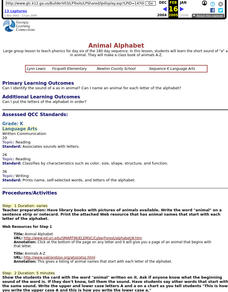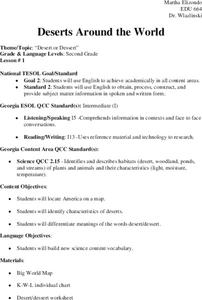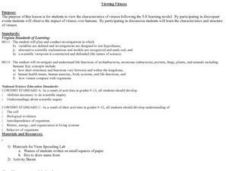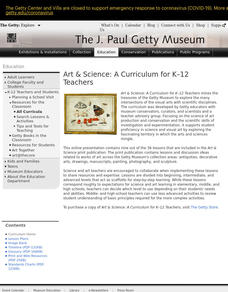Curated OER
AFRICA: "The Orphan Boy"
Students read a story of the Masai people The Orphan Boy. They create a list of characteristics of the Masai people. They write a descriptive poem about the Masai people.
Curated OER
An Automobile Phylogenetic Tree
Students construct a phylogenetic tree for various automobiles and trucks after considering important characteristics of these "organisms". They work in small groups to construct the trees and complete a set of questions then they...
Curated OER
Marshland Wonders
Students review the characteristics of wetlands and list their benefits. After viewing short videos, they identify the organims that make their home in wetlands and how they have adapted. They compare and contrast the characteristics...
Curated OER
Weather "Whys" Lesson 4: Spring
Students explore the attributes of spring. In this weather lesson, students collect data regarding weather from various media. Students graph simple weather data and dress animals for forecasted weather. Students discuss the...
Curated OER
Are You One of Us?
Students investigate how scientists sort and classify organisms. In this sorting and classifying lesson, students examine what systematics are as tools that scientists use. They examine images of invertebrates and sort them while stating...
Curated OER
Animal Alphabet
Students make a class animal book using the letters of the alphabet. They use a website imbedded in this plan to get pages with animals that begin with any of the 26 letters.
Curated OER
Comparing Hares and Rabbits
Sixth graders research and investigate the Arctic hare and the snowshoe hare, and the order hares and rabbits. They explore an animal website and compare/contrast the two animals, recording their data on a chart.
Curated OER
Home Sweet Home
Students examine the change in the diversity of animals living in an area before and after development. In order to do this, students need to have access to an area near their school which is undeveloped. A good, "real life" activity.
Curated OER
Dissect with Respect
Students, through exercises and discussions, examine ethics involved in the process of choosing and using laboratory animals, respect for the animal they dissect and how to behave in an ethical manner as they dissect various lab specimens.
Curated OER
History of the Earth
Students work together in groups to research the characteristics of the Mesozoic Era. Using various sources, they must include information about climate, landforms, plants and animals found during this time period. They create a...
Curated OER
Pond Habitats
Pupils define what a pond habitat is and explain what animals live in this habitat. They discuss what can harm or destroy a pond habitat. They create a poster of what could harm a pond habitat including illustrations and sentences. ...
Curated OER
Stop, Look and Listen
Students study and observe city wildlife and their local community's wildlife. In this wildlife lesson, students look for animal clues in their local places. Students observe animals using cameras and journals. Students make a...
Alabama Learning Exchange
I Will Survive
Young scholars explore animal adaptations. In this animal science lesson, students watch the video "Kratt's Kreatures" and work in groups to complete a worksheet about animal adaptations.
Curated OER
Under The Sea
In this resource lesson, students use non-fiction books to research ocean animals. Students discover the many features of non-fiction books and how to use these features to help them conduct research. Students then categorize ocean...
Curated OER
Rainforests: What Are They?
Second graders investigate rain forests by reading a habitat checklist. In this environment lesson, 2nd graders read the book The Great Kapok Tree, and discuss what characteristics make up a rain forest. Students explore a habitat...
Curated OER
Elephants
Students research an elephant habit and present their findings to the class. In this elephant lesson plan, students also answer short answer questions about elephant characteristics and features.
Curated OER
The Great Winged Adventure
Learners identify characteristics of birds, name several species, and explain how birds fly. They make nests and give bird presentations.
Curated OER
It's Alive
First graders critically analyze living and nonliving objects, then develop a list of characteristics to classify objects on a science walk. They make a book to close out the lesson plan.
Curated OER
Deserts Around the World
Second graders explore the deserts around the world. They use a map and locate America on the map. Students discuss and identify the characteristics of deserts and differentiate the meanings of the word desert and dessert. Students...
Curated OER
Viewing Viruses
Students view the characteristics of viruses following the 5-E learning model. By participating in discrepant events Students observe the impact of viruses over humans. By participating in discussion students examine the characteristics...
Curated OER
The Prairie Dog That Met the President
Students study the history of jazz music. They listen to various examples of jazz music and complete a worksheet in which they must identify the individual instruments they hear and identify characteristics of the genre of jazz music.
Curated OER
Fall vs. Spring
Learners learn about fall and spring by engaging in hands-on activities in order to fulfill science and language arts standards. In this lesson on seasons, students first listen to a story about fall, discuss the characteristics of the...
Alabama Learning Exchange
Botany Scavenger Hunt Where's the Ginkgo?
Learners use a science journal to log plants that are native to Alabama. In this plant lesson plan, students identify characteristics, describe environments, and classify the plants that they find.
Curated OER
Clearly Classified
Learners investigate plants and insects. In this science classification lesson, students create separate categories for insects and plants by characteristics. Learners discover scientific names of insects.
























